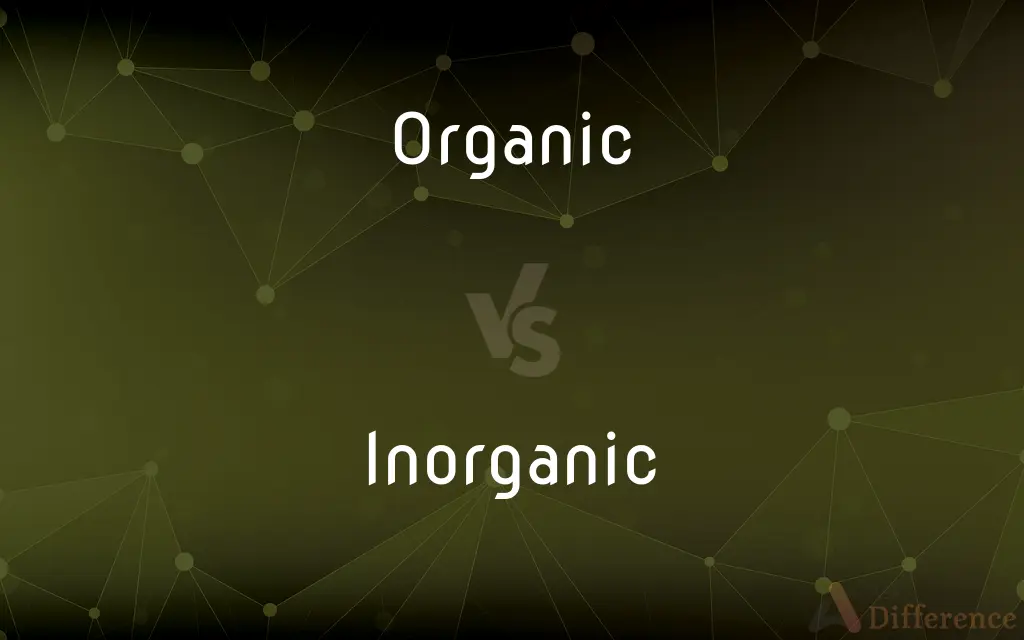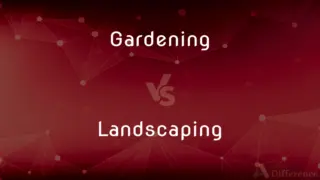Organic vs. Inorganic — What's the Difference?
By Tayyaba Rehman & Urooj Arif — Updated on March 21, 2024
Organic compounds primarily contain carbon and are found in living organisms, involving natural processes, whereas inorganic compounds generally lack carbon and encompass a broader range of substances, including minerals and metals.

Difference Between Organic and Inorganic
Table of Contents
ADVERTISEMENT
Key Differences
Organic chemistry focuses on the study and chemical reactions of compounds that contain carbon, typically associated with living organisms or products derived from them. These compounds, such as carbohydrates, proteins, lipids, and nucleic acids, play crucial roles in biological processes. For instance, glucose, a simple sugar, is a primary energy source for cells. On the other hand, inorganic chemistry deals with compounds that do not contain carbon-hydrogen bonds, covering a wide array of substances including metals, minerals, salts, and gases like oxygen and nitrogen. These inorganic compounds are essential in various industrial processes, construction materials, and as catalysts in chemical reactions.
While organic compounds are characterized by their carbon-based structure, often forming complex molecules like DNA or proteins, inorganic compounds include simple salts as well as complex minerals and metals. The complexity of organic molecules allows for the vast diversity of life, with compounds capable of forming long chains and rings that serve as the backbone for DNA, proteins, and other essential biological molecules. In contrast, inorganic compounds can form structures like crystals or metals, which are fundamental in non-living systems and are used in a variety of technological and industrial applications.
Organic compounds are often associated with natural processes and life, undergoing decomposition over time through biological means. They play a key role in the carbon cycle, contributing to the ecosystem's balance by recycling carbon. Inorganic compounds, while they can be involved in biological processes, are more stable and less susceptible to decomposition, playing critical roles in the Earth's crust formation, water purification, and as nutrients in soil.
The solubility of organic compounds is primarily in organic solvents due to their hydrophobic nature, which is attributed to the nonpolar bonds between carbon and hydrogen. These compounds are crucial in pharmaceuticals, agrochemicals, and plastics. In contrast, inorganic compounds tend to be soluble in water, making them essential in processes such as water treatment, mineral extraction, and the manufacturing of ceramics and glass.
The distinction between organic and inorganic chemistry lies in the presence of carbon and the type of compounds studied. Organic chemistry's focus on carbon-based compounds reveals the complexity and versatility necessary for life, whereas inorganic chemistry encompasses a broader range of substances, playing essential roles in both biological and non-biological systems.
ADVERTISEMENT
Comparison Chart
Basic Definition
Compounds primarily containing carbon.
Compounds generally lacking carbon.
Key Elements
Carbon, hydrogen.
Metals, minerals, salts, gases.
Found In
Living organisms, natural processes.
Minerals, metals, the Earth's crust.
Complexity
Complex molecules like DNA, proteins.
Simple salts to complex minerals.
Role in Nature
Crucial for life, decomposable.
Stable, involved in geological processes.
Solubility
Soluble in organic solvents.
Soluble in water.
Applications
Pharmaceuticals, agrochemicals.
Construction, water treatment.
Compare with Definitions
Organic
Glucose is an organic compound essential for cellular energy.
Essential energy source.
Inorganic
Quartz, an inorganic mineral, is used in electronics.
Technological application.
Organic
Proteins, organic compounds, are vital for body functions.
Building blocks of life.
Inorganic
Carbon dioxide, although containing carbon, is considered inorganic.
Exception in classification.
Organic
Methane, an organic gas, contributes to greenhouse effects.
Environmental impact.
Inorganic
Iron, an inorganic element, is used in construction.
Construction material.
Organic
DNA, an organic molecule, carries genetic information.
Genetic blueprint.
Inorganic
Ammonia, an inorganic compound, is used as a fertilizer.
Agricultural use.
Organic
Ethanol, an organic solvent, is used in industries and beverages.
Versatile solvent and consumable.
Inorganic
Salt, an inorganic compound, is crucial for human health.
Dietary necessity.
Organic
Relating to or derived from living matter
Organic soils
Inorganic
Not consisting of or deriving from living matter.
Organic
(of food or farming methods) produced or involving production without the use of chemical fertilizers, pesticides, or other artificial chemicals
Organic farming
Organic meat
Inorganic
Relating to or denoting compounds which are not organic (broadly, compounds not containing carbon).
Organic
Relating to a bodily organ or organs.
Inorganic
Not explainable by the normal processes of etymology.
Organic
Denoting or characterized by a harmonious relationship between the elements of a whole
The organic unity of the integral work of art
Inorganic
Involving neither organic life nor the products of organic life.
Organic
A food produced by organic farming.
Inorganic
Not composed of organic matter.
Organic
An organic chemical compound.
Inorganic
(Chemistry) Of or relating to compounds not containing hydrocarbon groups or derivatives.
Organic
Of, relating to, or derived from living organisms
Organic matter.
Inorganic
Not arising in normal growth; artificial.
Organic
Of, relating to, or affecting a bodily organ
An organic disease.
Inorganic
Lacking system or structure.
Organic
Of, marked by, or involving the use of fertilizers or pesticides that are strictly of animal or vegetable origin
Organic vegetables.
An organic farm.
Inorganic
(chemistry) relating to a compound that does not contain carbon
Organic
Raised or conducted without the use of drugs, hormones, or synthetic chemicals
Organic chicken.
Organic cattle farming.
Inorganic
That does not originate in a living organism
Organic
Serving organic food
An organic restaurant.
Inorganic
(chemistry) An inorganic compound
Organic
Simple, healthful, and close to nature
An organic lifestyle.
Inorganic
Not organic; without the organs necessary for life; devoid of an organized structure; unorganized; lifeness; inanimate.
Organic
Having properties associated with living organisms.
Inorganic
Of or pertaining to compounds that are not derivatives of hydrocarbons; not organic{5}.
Organic
Resembling a living organism in organization or development; interconnected
Society as an organic whole.
Inorganic
Relating or belonging to the class of compounds not having a carbon basis;
Hydrochloric and sulfuric acids are called inorganic substances
Organic
Constituting an integral part of a whole; fundamental.
Inorganic
Lacking the properties characteristic of living organisms
Organic
(Law) Denoting or relating to the fundamental or constitutional laws and precepts of a government or an organization.
Organic
(Chemistry) Of or designating carbon compounds.
Organic
An organic food or a product made from organic materials.
Organic
A substance, especially a fertilizer or pesticide, of animal or vegetable origin.
Organic
(Chemistry) An organic compound.
Organic
(biology) Pertaining to or derived from living organisms.
Organic
Pertaining to an organ of the body of a living organism.
Organic
(chemistry) Relating to the compounds of carbon, relating to natural products.
Organic
(agriculture) Of food or food products, grown in an environment free from artificial agrichemicals, and possibly certified by a regulatory body.
Organic
(sociology) Describing a form of social solidarity theorized by Emile Durkheim that is characterized by voluntary engagements in complex interdependencies for mutual benefit (such as business agreements), rather than mechanical solidarity, which depends on ascribed relations between people (as in a family or tribe).
Organic
(military) Of a military unit or formation, or its elements, belonging to a permanent organization (in contrast to being temporarily attached).
Organic
Instrumental; acting as instruments of nature or of art to a certain destined function or end.
Organic
Generated according to the ranking algorithms of a search engine, as opposed to paid placement by advertisers.
Organic
Developing in a gradual or natural fashion.
The writing of the script was an organic process.
Organic
Harmonious; coherent; structured.
The production came together in an organic whole.
Organic
(chemistry) An organic compound.
Organic
An organic food.
Organic
(science fiction) A living organism, as opposed to a robot or hologram.
Organic
Of or pertaining to an organ or its functions, or to objects composed of organs; consisting of organs, or containing them; as, the organic structure of animals and plants; exhibiting characters peculiar to living organisms; as, organic bodies, organic life, organic remains. Cf. Inorganic.
Organic
Produced by the organs; as, organic pleasure.
Organic
Instrumental; acting as instruments of nature or of art to a certain destined function or end.
Those organic arts which enable men to discourse and write perspicuously.
Organic
Forming a whole composed of organs.
Organic
Of or pertaining to compounds which are derivatives of hydrocarbons; pertaining to, or denoting, any one of a large series of carbon-containing compounds which are related to the carbon compounds produced by biological processes (such as methane, oils, fats, sugars, alcohols, ethers, proteins, etc.) and include many substances of artificial production which may or may not occur in animals or plants; - contrasted with inorganic.
Organic
A fertilizer that is derived from animal or vegetable matter
Organic
Relating or belonging to the class of chemical compounds having a carbon basis;
Hydrocarbons are organic compounds
Organic
Of or relating to or derived from living organisms;
Organic soil
Organic
Being or relating to or derived from or having properties characteristic of living organisms;
Organic life
Organic growth
Organic remains found in rock
Organic
Involving or affecting physiology or bodily organs;
An organic disease
Organic
Of or relating to foodstuff grown or raised without synthetic fertilizers or pesticides or hormones;
Organic eggs
Organic vegetables
Organic chicken
Organic
Simple and healthful and close to nature;
An organic lifestyle
Organic
Constitutional in the structure of something (especially your physical makeup)
Common Curiosities
What defines a compound as organic?
A compound is defined as organic if it contains carbon, typically associated with living organisms.
What role do inorganic compounds play in the environment?
Inorganic compounds play critical roles in geological and environmental processes, such as forming the Earth's crust and participating in the water cycle.
How do organic and inorganic compounds differ in solubility?
Organic compounds tend to be soluble in organic solvents, whereas inorganic compounds are more likely to be soluble in water.
Why are organic compounds important for life?
Organic compounds are essential for life because they make up the cells and tissues of organisms and participate in life-sustaining processes.
Can inorganic compounds contain carbon?
Yes, but rarely. Examples include carbon dioxide and carbonates, which are considered inorganic.
Can organic compounds be synthesized?
Yes, organic compounds can be synthesized in laboratories, expanding their use in pharmaceuticals and chemicals.
What is an example of an inorganic compound used in daily life?
Table salt (sodium chloride) is an inorganic compound used daily in food.
Can inorganic compounds be organic?
By definition, inorganic compounds do not fall under the category of organic chemistry, except for a few exceptions like carbonates.
How do organic compounds affect the environment?
Organic compounds, such as fossil fuels and pesticides, can have both beneficial and detrimental effects on the environment.
What is a common use of inorganic compounds in industry?
Inorganic compounds are commonly used in construction, manufacturing, and as catalysts in chemical reactions.
Are all toxic compounds inorganic?
No, both organic and inorganic compounds can be toxic depending on their nature and concentration.
How do organic compounds contribute to the carbon cycle?
Organic compounds contribute to the carbon cycle through processes like photosynthesis, respiration, and decomposition.
Do all organic compounds come from living things?
While organic compounds are associated with life, they can also be synthesized artificially.
Why are inorganic compounds important in technology?
Inorganic compounds are crucial in technology for creating materials like metals, semiconductors, and catalysts used in various industrial processes.
What is the significance of carbon in organic compounds?
Carbon's ability to form stable, complex structures with other elements makes it fundamental to organic chemistry.
Share Your Discovery

Previous Comparison
Firm vs. Company
Next Comparison
Gardening vs. LandscapingAuthor Spotlight
Written by
Tayyaba RehmanTayyaba Rehman is a distinguished writer, currently serving as a primary contributor to askdifference.com. As a researcher in semantics and etymology, Tayyaba's passion for the complexity of languages and their distinctions has found a perfect home on the platform. Tayyaba delves into the intricacies of language, distinguishing between commonly confused words and phrases, thereby providing clarity for readers worldwide.
Co-written by
Urooj ArifUrooj is a skilled content writer at Ask Difference, known for her exceptional ability to simplify complex topics into engaging and informative content. With a passion for research and a flair for clear, concise writing, she consistently delivers articles that resonate with our diverse audience.
















































